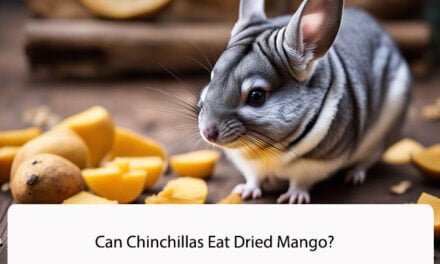Chinchillas are adorable little creatures that make great pets for animal lovers. These furry rodents require a specific diet to maintain their health and well-being. As a chinchilla owner, it’s important to know what foods are safe to feed your pet and what foods should be avoided. In this article, we will explore the question: can chinchillas eat dried strawberries?
Dried strawberries are a popular snack for humans, but can chinchillas enjoy this treat as well? The answer is yes, chinchillas can eat dried strawberries in moderation. However, it’s important to note that dried fruits, including strawberries, should not be a regular part of your chinchilla’s diet. Chinchillas require a diet that is high in fiber and low in sugar, so feeding them too many dried fruits can lead to health problems such as obesity and dental issues.
When feeding your chinchilla dried strawberries, it’s important to choose high-quality, organic brands that do not contain any added sugars or preservatives. You should also limit the amount of dried strawberries you give to your chinchilla to no more than a few pieces per week. By providing your chinchilla with a balanced and healthy diet, you can help ensure that they live a long and happy life.
Chinchilla Dietary Basics
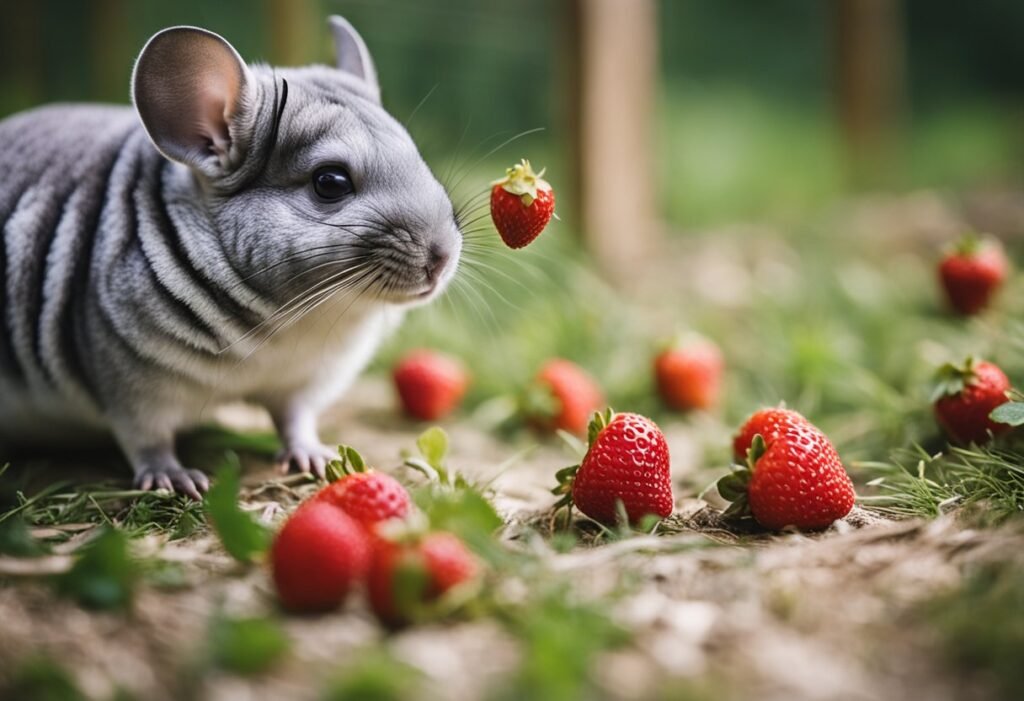
Understanding Chinchilla Nutrition
As responsible chinchilla owners, we must ensure that our pets receive a balanced diet that meets their nutritional needs. Chinchillas are herbivores and require a diet that is high in fiber and low in fat. Their digestive system is sensitive and can be easily upset by foods that are not suitable for them. Therefore, it is important to provide them with a diet that is appropriate for their species.
Natural Diet of Chinchillas
In the wild, chinchillas primarily feed on grasses, herbs, and shrubs. Their diet is low in fat and high in fiber, which helps to maintain their digestive health. They also consume a variety of plant materials, including bark, leaves, and flowers. As herbivores, chinchillas have a unique digestive system that allows them to extract nutrients from plant materials efficiently.
When it comes to feeding our pet chinchillas, we need to replicate their natural diet as closely as possible. This means providing them with a variety of hay and fresh vegetables. We should also avoid feeding them foods that are high in fat or sugar, as these can cause health problems such as obesity and dental issues.
In conclusion, understanding the nutritional needs of our chinchillas is essential for their health and wellbeing. By providing them with a balanced diet that is appropriate for their species, we can ensure that they live long and healthy lives.
Benefits of Dried Strawberries for Chinchillas
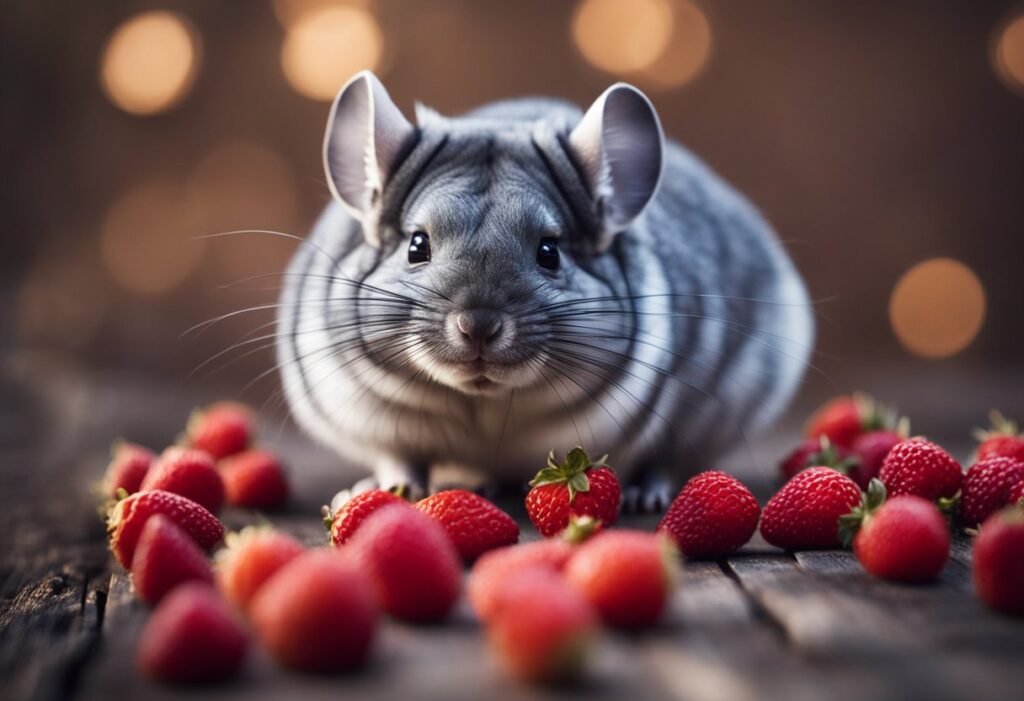
When it comes to feeding chinchillas, it is important to ensure that they receive a balanced and nutritious diet. While hay and pellets are the mainstays of a chinchilla’s diet, incorporating small amounts of fruits and vegetables can provide additional nutrients and variety. In this section, we will discuss the benefits of dried strawberries for chinchillas.
Vitamin Content
Dried strawberries are a good source of vitamins and minerals that are essential for a chinchilla’s health. They are particularly rich in vitamin C, which is important for maintaining a healthy immune system. Chinchillas, like humans, cannot produce their own vitamin C, so they must obtain it from their diet. Dried strawberries can help to ensure that your chinchilla is getting enough vitamin C to stay healthy.
In addition to vitamin C, dried strawberries also contain other important vitamins such as vitamin K and vitamin E. Vitamin K is important for blood clotting and bone health, while vitamin E is an antioxidant that helps to protect cells from damage.
Dental Health
Chinchillas have constantly growing teeth, so it is important to provide them with foods that help to wear down their teeth and prevent overgrowth. Dried strawberries are a good source of fiber, which can help to promote dental health by keeping teeth clean and wearing them down naturally.
However, it is important to note that dried strawberries, like all fruits, are high in sugar. Too much sugar can lead to dental problems and other health issues, so it is important to feed dried strawberries in moderation as a treat rather than a regular part of your chinchilla’s diet.
In conclusion, dried strawberries can provide a range of benefits for chinchillas when fed in moderation as part of a balanced diet. They are a good source of vitamins and minerals, particularly vitamin C, and can help to promote dental health. As with any food, it is important to feed dried strawberries in moderation and to monitor your chinchilla’s health closely.
Risks of Feeding Dried Strawberries to Chinchillas
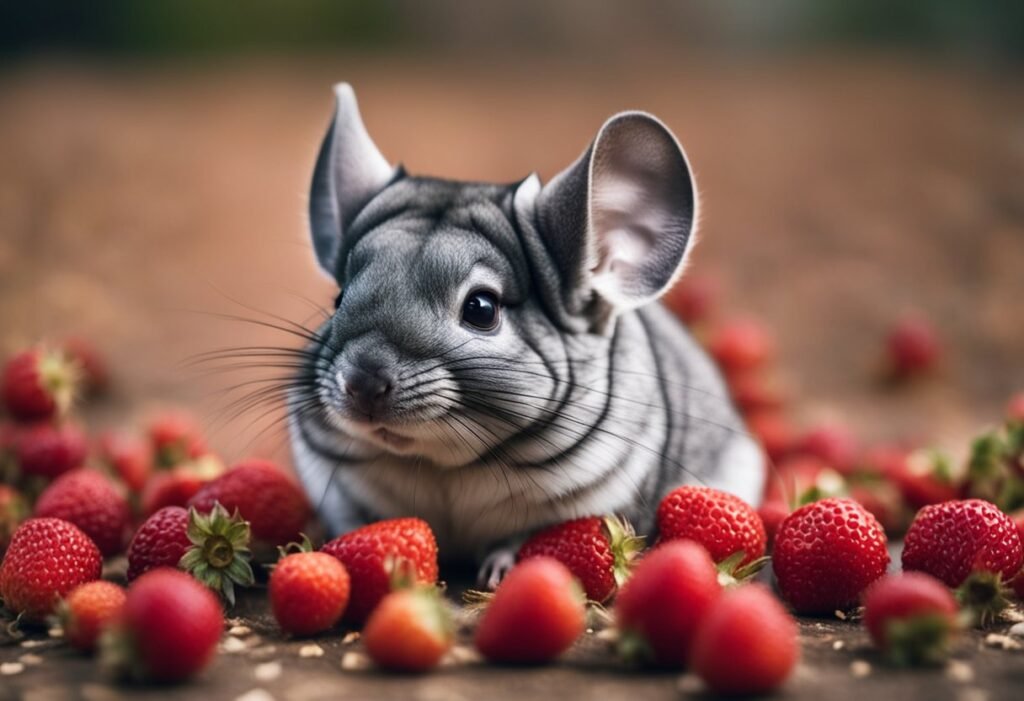
Dried strawberries are a popular snack for humans, but can chinchillas eat them too? While dried strawberries are not toxic to chinchillas, there are some risks associated with feeding them to these small rodents.
Sugar Content
Dried strawberries are high in sugar, which can be harmful to chinchillas. Chinchillas have a sensitive digestive system and are prone to developing health issues such as dental problems, obesity, and diabetes if they consume too much sugar. Therefore, it is important to limit the amount of dried strawberries you feed to your chinchilla.
Potential Digestive Issues
In addition to the high sugar content, dried strawberries can also cause digestive issues in chinchillas. Chinchillas require a diet that is high in fiber and low in fat to maintain their overall health. Dried strawberries are low in fiber and high in carbohydrates, which can lead to digestive problems such as diarrhea, bloating, and stomach pain.
To ensure the health and well-being of your chinchilla, it is best to avoid feeding them dried strawberries altogether. Instead, provide them with a balanced diet that includes hay, pellets, and fresh vegetables. If you do decide to give your chinchilla dried strawberries as a treat, do so in moderation and monitor their health for any signs of digestive issues.
Feeding Guidelines
When it comes to feeding chinchillas, it is important to provide them with a balanced diet that meets their nutritional needs. While dried strawberries may seem like a tasty treat for your furry friend, it is important to exercise caution and follow some basic guidelines to ensure their health and well-being.
Portion Control
Chinchillas have sensitive digestive systems and can suffer from digestive problems if they consume too much of any one food. As such, it is important to practice portion control when feeding your chinchilla. We recommend limiting dried strawberries to no more than one or two pieces per day, depending on the size of your chinchilla. It is also important to note that dried strawberries should not be a substitute for their regular diet.
Frequency of Feeding
In addition to portion control, it is important to consider the frequency of feeding when it comes to dried strawberries. We recommend feeding dried strawberries as an occasional treat, rather than a regular part of their diet. Overfeeding dried strawberries can lead to weight gain and other health problems, so it is important to practice moderation.
Overall, while dried strawberries can be a tasty treat for chinchillas, it is important to follow these feeding guidelines to ensure their health and well-being. As always, consult with your veterinarian if you have any concerns about your chinchilla’s diet or health.
Preparation of Dried Strawberries
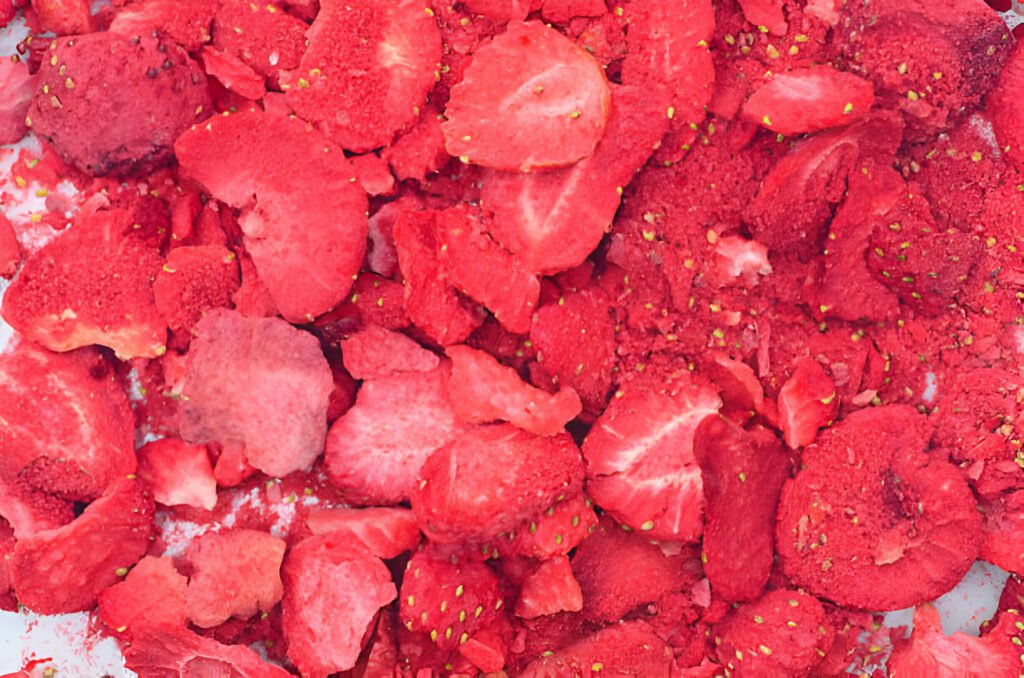
When it comes to feeding our chinchillas, we always want to provide them with the best and healthiest options. Dried strawberries are a tasty treat that can be a great addition to their diet. However, it’s important to ensure that they are prepared properly to avoid any potential harm.
Selection of Strawberries
The first step in preparing dried strawberries is selecting the right type of strawberries. It’s important to choose fresh, ripe, and firm strawberries. Ripe and firm strawberries will help ensure that they don’t turn mushy during the drying process. It’s important to avoid using strawberries that are overripe or have any signs of mold or damage.
Drying Process
Once you have selected the right strawberries, it’s time to start the drying process. There are different methods to dry strawberries, including using a dehydrator or an oven. Regardless of the method, it’s important to follow the instructions carefully to ensure that the strawberries are dried properly.
If you are using a dehydrator, slice the strawberries into thin, uniform pieces and arrange them in a single layer on the trays. Set the temperature to 135°F and let them dry for around 8-12 hours. Make sure to check on them periodically to ensure that they are drying evenly.
If you are using an oven, preheat it to 200°F. Slice the strawberries into thin, uniform pieces and place them on a baking sheet lined with parchment paper. Bake them for around 3-4 hours, or until they are dried and slightly chewy.
Once the strawberries are dried, let them cool down completely before storing them in an airtight container. Dried strawberries can last for several months if stored properly.
Overall, dried strawberries can be a great treat for our chinchillas if prepared properly. By selecting the right strawberries and following the right drying process, we can ensure that our chinchillas are getting a tasty and healthy snack.
Alternative Treats for Chinchillas
While dried strawberries may be a tasty treat for chinchillas, it’s important to remember that they should only be fed in moderation. As with any treat, too much can cause digestive issues and potentially harm your furry friend.
Luckily, there are plenty of alternative treats that chinchillas can enjoy without any negative side effects. Here are a few options:
- Timothy hay cubes – These are a great source of fiber and can help keep your chinchilla’s teeth healthy.
- Rose hips – These are high in vitamin C and can provide a nutritional boost to your chinchilla’s diet.
- Dried apple rings – These are a tasty and safe alternative to dried strawberries.
- Pumice stones – These can help keep your chinchilla’s teeth healthy and provide a fun and safe chewing activity.
Remember, treats should only make up a small portion of your chinchilla’s diet. The majority of their diet should consist of hay, pellets, and fresh water. By offering alternative treats in moderation, you can ensure that your chinchilla stays happy and healthy.
Frequently Asked Questions
What fruits are safe for chinchillas to consume?
Chinchillas require a diet that is high in fiber and low in fat. Therefore, it is important to provide them with fresh hay, fresh water, and a small amount of pellets. When it comes to fruits, chinchillas can safely consume small amounts of fresh fruit as a treat. Some safe fruits for chinchillas include apples, bananas, blueberries, and cherries.
Are dried strawberries a safe treat for chinchillas?
Dried strawberries can be a tasty treat for chinchillas, but they should be given in moderation. It is important to note that dried fruits are high in sugar and can lead to health problems if given in excess. Additionally, some dried fruits may contain added preservatives or chemicals that can be harmful to chinchillas. Therefore, it is best to limit the amount of dried fruit given to chinchillas.
What are the healthiest treats for chinchillas?
The healthiest treats for chinchillas are those that are high in fiber and low in fat and sugar. Some examples include fresh hay, fresh vegetables, and small amounts of fresh fruit. It is important to remember that treats should only make up a small portion of a chinchilla’s diet, and should not be given in excess.
Which dried fruits can chinchillas eat?
Chinchillas can safely consume small amounts of dried fruits as a treat. Some safe dried fruits for chinchillas include dried apples, dried bananas, and dried blueberries. However, it is important to remember that dried fruits are high in sugar and should be given in moderation.
What foods should chinchillas avoid?
Chinchillas should avoid foods that are high in fat, sugar, and salt. Some examples include chocolate, nuts, seeds, and processed foods. Additionally, chinchillas should not be given any foods that are toxic to them, such as avocado, rhubarb, or onions.
How often can chinchillas be given fruit treats?
Chinchillas can be given fruit treats once or twice a week in small amounts. It is important to remember that treats should only make up a small portion of a chinchilla’s diet, and should not be given in excess. Additionally, it is important to monitor a chinchilla’s weight and overall health when giving treats.





